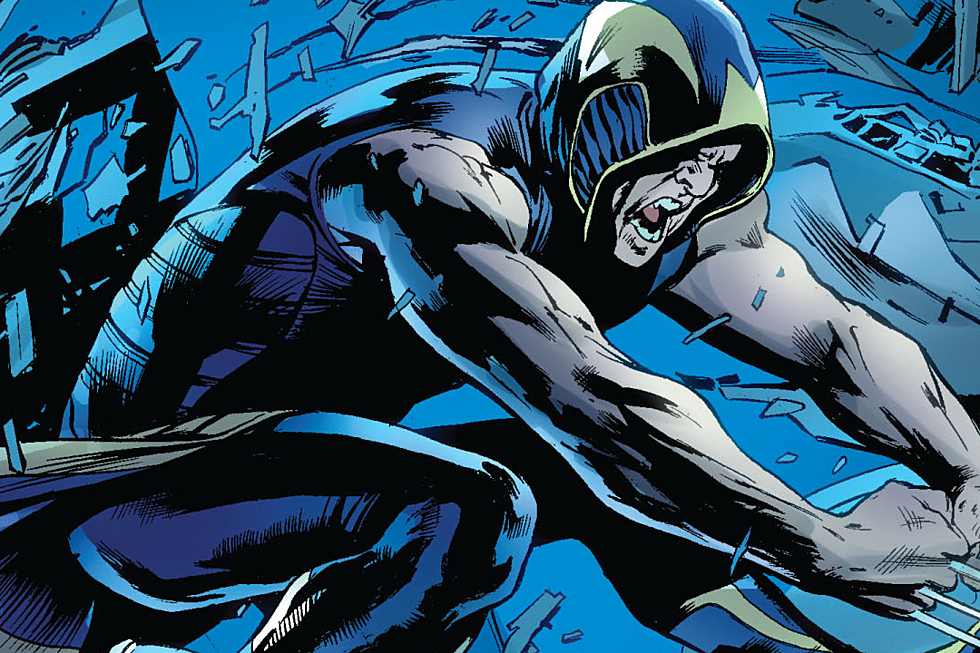![‘Ultimates’ #1 Puts The Series Back On Track [Spoiler-Free Review]](http://townsquare.media/site/622/files/2011/08/untitled-1-1314127642.jpg?w=980&q=75)
‘Ultimates’ #1 Puts The Series Back On Track [Spoiler-Free Review]

This week, Marvel Comics brings back the Ultimates - no "new", no numbers like Ultimates 2 or Ultimates 3, just a regular ol' ongoing series - with Ultimates #1 by Jonathan Hickman, Esad Ribic and Dean White. Building off of plot points in Ultimate Fallout and Mark Millar's last arc in Ultimate Avengers vs. New Ultimates, this series sees Hickman's return to the Ultimate Universe since he re-established Thor's origin in last year's Ultimate Thor with Carlos Pacheco. How does this new series stack up to its auspicious, chart-topping predecessors by Mark Millar and Jeph Loeb? Find out below in a spoiler-free review after the jump.

In short: Yeah, I think this is pretty much what everyone wanted.
It is not unfair to say that following Mark Millar and Bryan Hitch's two thirteen-issue runs on Ultimates and Ultimates 2, the work Jeph Loeb did with the characters in Ultimates 3, Ultimatum and New Ultimates alienated many longtime readers by transforming what used to be a hyper-politically-aware pseudo-satire into Jersey Shore with repulsors. The original interpretation of The Ultimates -- "The Avengers for modern times" -- became "Everyone has sex. A lot. Also, incest."
While Millar's run was short on subtlety, one thing it wasn't short on was relevancy. It might even seem dated now, but the Millar/Hitch Ultimates was unapologetically and enthusiastically of its time, when George W. Bush and Freddie Prinze, Jr. jokes seemed fresh and hip, or desperately wanted to look so. But in the process, Millar and Hitch delivered a story and aesthetic that redefined the Marvel style and prompted Marvel Studios' approach to the feature films based on those characters. Jeph Loeb's Ultimates gave us sex tapes, cuckolded robots and cannibalism.
So what does Jonathan Hickman give us? A new superhero comic that's half Robert Ludlum and half Jack Kirby, and something that feels like a logical escalation of the very popular work Millar and Hitch did. It's still a world where the Avengers are super-soldiers rather than super-heroes, and everything we know or recognize is a bit off, or skewed, by this military presence. There are numerous characters in this book that Hickman's written, sometimes quite extensively, in the regular Marvel Universe, but his Nick Fury here seems completely different from the one we've seen in Secret Warriors, and another character is a very deliberate, dark inversion of the one Hickman writes on a regular basis.
The attempt to marry technothriller infodump to grand, sweeping superhero majesty is no clearer than in the second and third scenes of the book. The second scene was released as a preview in the back of many Marvel titles in recent weeks, and depicts a sit-rep delivered to Nick Fury that's filled with international intrigue and reports from the President. The third scene, which is completely silent, involves a bear drinking beer and a self-replicating nanotechnological dome. Hickman makes these disaparate elements work well together by playing the goofy stuff as straight as he possibly can, as well as pacing the issue at truly breakneck speed. Fury is quickly presented with multiple new twists and problems on every page. Seemingly disconnected crises pile on with great frequency, communicating Fury's hectic schedule and mounting panic very well to the reader.
While it's difficult to discuss the story while also skirting around the identity of book's the main villain -- who Marvel deliberately left out of the preview -- it is easy to discuss Esad Ribic and Dean White's gorgeous artwork. Ribic had a very successful career as a painter for a few years -- look at the covers for House of M or the interior work he did with J. Michael Straczynski on Silver Surfer: Requiem -- but he's recently started re-reinventing himself as a penciller to great effect, especially in a recent run on Uncanny X-Force. Here Marvel's dropped the ink component entirely, with Ribic's art digitally painted by the incredible Dean White. The results are stunning and achieve a realistic look without losing sight of the fantastic or resorting to extensive photoreference.
As expected, Jonathan Hickman's first issue of Ultimates is an incredibly promising start, bringing the series back to its widescreen technodrama roots while also evolving past them in a direction that feels fully logical. My only major concern is that I'm not sure how it'll work with new readers, which is a big problem with a new #1. The villain's motivation, as well as Captain America's absence, are both set up in the Ultimate Fallout miniseries and are largely enigmas in this context. Whether those factors will matter to new readers at all, I don't know; it's difficult for me to divorce this book from the context of the Ultimate Universe I've formed by reading the line for the past ten years.
What I do know that Ultimates #1 is a damn good comic.






More From ComicsAlliance

![Reinvention Is Vital: Tom Muller Goes All In On Comics Design [Interview]](http://townsquare.media/site/622/files/2017/03/muller-feat.jpg?w=980&q=75)




![Civil War Correspondence: Ceasefire [Recapping ‘Civil War II’ #8]](http://townsquare.media/site/622/files/2016/12/CWII-Featured.jpg?w=980&q=75)
![Scott Snyder Reveals How He Keeps The Villains Scary In ‘All-Star Batman’ [Interview]](http://townsquare.media/site/622/files/2016/12/ASB0.jpg?w=980&q=75)
![Sister Vs Sister In ‘Gamora’ #1 By Nicole Perlman And Marco Checchetto [Preview]](http://townsquare.media/site/622/files/2016/11/Gamora_1_Featured.jpg?w=980&q=75)
